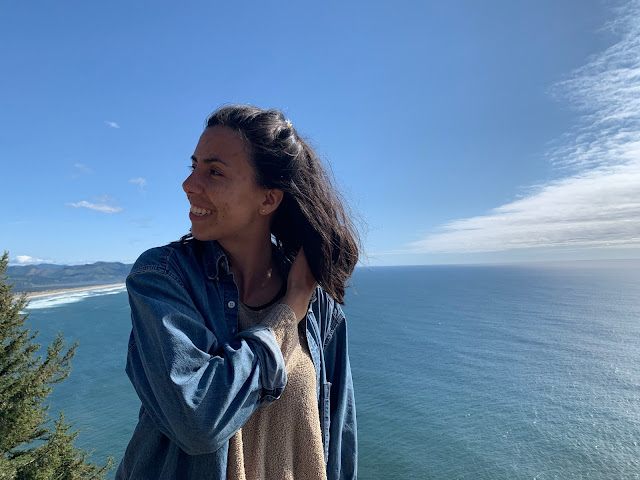finding rest: a year of wrestling, healing, and letting go
One year ago this week, I shared publicly that I might be losing my faith.
I was tired of pretending, tired of double-thinking everything I said or wrote or posted in order to maintain a facade of “faithful Christian.” After months of wondering how I would say it, the post came together in one day. I never used the word “deconstruction,” and I never said I wasn’t a Christian. I walked the middle line, but walked it confidently. When I clicked “publish,” I closed my laptop, hopped in the car with a friend, and drove to the beach at White Rock. I walked out into the water and stood there, baptizing myself again. “I baptize myself into…” I waited for something profound. It didn’t come. “I don’t know!” I said, and plunged into the water. The post was called “Ending Up Free,” and I felt it.
People responded. Sure, there were plenty of the negative or well-meaning comments that I expected. But there were far more comments and messages from people throughout my life who were saying, “Yes,” “Me too,” “I needed someone to say this,” “I’ve been feeling this,” “I thought I was the only one.” I started writing other posts that I felt “doubters” like me needed: one about hell being a non-essential, one about the misconceptions people who question their faith often face. People resonated, shared, reached out, kept saying “Yes.” Suddenly I was again the face of faith, but a different kind of faith. I was becoming the face of the middle ground.
With this new publicity and honesty, a new wave of grief started to hit me. I felt like it was becoming clear that I would truly never be Christian in the way “Christian” is usually defined. And I wasn’t as sad about losing a label as I was that the label had failed me. I had given my absolute all to this faith, and it felt like was melting away like ice. Now that I had somewhat given up trying to make an orthodox faith hold up, I was being confronted even more strongly by everything I was losing. And I started to unpack the effects it had had on me for 25 years.
I went back to counseling, this time to a therapist with experience in detangling from the trauma of fundamentalism and extreme evangelical beliefs. I thought the term “trauma” was a bit over-the-top; I just wanted someone professional to help me make sure I was going the right direction in life. Going in for the first appointment, I actually felt so good that I wondered if I needed counseling. I told her my story easily, knowing the ins and outs of it so well already. But she noticed a connection, and probed deeper. She saw that there was a part of me teetering on the edge of a cliff. I knew it too. And as I started to say it, I fell apart. Through sobs I realized that my heart was trying so hard to keep Jesus. I was desperate for him to be more than a 1st century teacher because losing that relationship with him - even though it had felt absent for over a year - would be some of the worst grief I had ever faced. I didn’t want to face it.
Counseling revealed just how legitimate the term “trauma” was to describe many of the religious beliefs I’d grown up with. I combed through journals of my early teenage years and found that the extreme views of hell and personal responsibility and sin had warped my views of myself and made me feel at constant risk. Those fears had initiated bodily symptoms that I had been ignoring for years: extreme jumpiness, compulsive picking of skin, disassociation with my body, numbing of sexual attraction, and more. In the pages of my 13, 14, and 15-year-old journal, I saw a girl actively shaming all the goodness she knew was in her. I saw her forcing herself to believe and embody the religious messages she was hearing. I read my own words telling myself: you are unworthy of God’s love, you are worthless apart from Christ, you cannot trust yourself, you are not your own, you are full of sin. For the first time, I was finding that not only was the Christian culture I’d grown up in not as “true” as I’d thought, but in many ways it had actually harmed me.
I found that grieving the Jesus I knew and rediscovering myself were profoundly and beautifully tied. In a surprisingly spiritual sense, I recognized that the voice in my heart I’d always called “Jesus” or “God” may have simply been me. I thought I would be angry to discover that “it was just me all along,” and there were moments of anger. But quickly I felt that I was actually recovering so much of what I thought I was losing. I hadn’t lost the inner voice I’d called “Jesus.” I’d just been using his name, and now I was learning that it was my own. I couldn’t help but wonder if that is what Christ in me should have meant all along. Not that Christ was some outside being that came into me through a sacrifice to an angry God, but that Christ was simply another word for the divinity in all of us, in everyone.
And that is, in large part, the story of this past year: discovering that I have not lost all I thought I would lose. Finding purpose in the day to day. Watching as the religious anxiety faded away. Exploring new ways to experience spirituality, physicality, intellectualism, and everything else. Recovering pieces of myself I had long rejected or condemned.
If I could go back a year to the girl clicking “publish” on the most vulnerable statement she had yet to make, I would say:
Not everyone will understand, but not everyone needs to.
You are not going off the deep end.
You are not betraying your faith.
You are seeking and finding.
You will find rest for your soul.




"I recognized that the voice in my heart I’d always called “Jesus” or “God” may have simply been me" this is something I have discovered and grappled with over this past year too and it is so helpful to see it put into words. Thank you for sharing your experience!
ReplyDelete